|
1986-91, The Time of Mourning
Venetians, Romans and others, 1986.
Click here for 1987-89, Keeping and Giving
Click
here for 1990, Old Tombs and Others
Click here for
1991, Ashes
On the last day of December 1985, I decided to
return to my old images of Venice, the symbol for me of sensuality and
the aging of time... it was Rome had been eternity since my first
application to travel back in the early 1950's. I would begin
with Venice in that ending of 1985 because it seemed old Venice would
best represent the state of my dying senses in those years of mourning
after my wife's death in November of 1983. And, because I was--as
I had been in the mid 1970's after my first ten years as Director of
the College of SFAI--in the midst of a life of chaos and change, I went
back to the system of
"pre-established harmony" I had invented in 1974-5.
So the method for the spring of 1986 was to make a
group of random watercolor sketches, make a colored ground to put them
on, and make a grid for the "pre-established harmony" to put them in.
And because the etchings of Canaletto
were an intrinsic part of my
Venetian imagery, to use fragmentary photocopies of some of them in
some of the paintings. Same for Piranesi for Rome.
All paintings are
watercolor on paper, 39 x 24 inches
Images marked
** are described
in the catalog for my 2003 Retrospective at the Oakland Museum of California.
Click the
** to go to the
description.
Click here for
directory to all 1980's paintings.
Click here for
directory to all paintings
Scroll down for the paintings, click the image
for a larger view.
The Venetians...
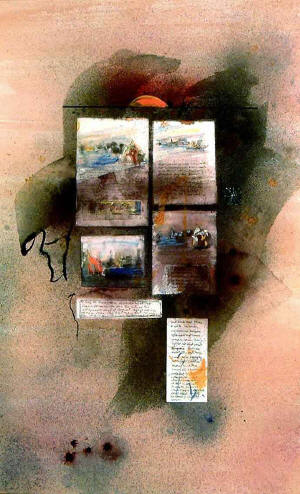
It was in those years of childhood
December 31, 1985
About “It was in those years…” When I was a
child in Alameda, our living room had pictures of Venice in the sunset
and an Italian garden with a fountain. My room had a Spanish galleon
with a great red cross on the sail, a Viking ship with a dragon prow,
and a clipper ship all blue water and golden clouds. I was a “ships”
kid, I suppose because my parents had given me Gordon Grant’s Book
of Old Ships to look at and draw from when I was in bed for three
months with rheumatic fever. The kid across the street was a “trains”
kid (his dad worked for the Southern Pacific Railroad). The kid
across the street was older than me, and we argued as to whether ships
or trains were best. He yelled louder and I cried. I had those
pictures of Italy and of the ships all the time until I became a
student at Berkeley and was told such things were “not art.” I made
this painting to remember those lost pictures forever.
|
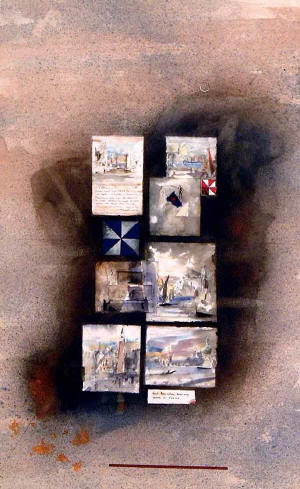
And then when evening comes in Venice
January 5, 1986
About “And then when evening comes…” It
was the Venetian imagery as I had built it from the framed calendar
pictures in my parents’ living room, from my
Landscape Annual, Italy, 1823, and my book of facsimiles of
Canaletto etchings—both from the early days of my marriage to
Jean—and from imagining Rome as the eternal city of Reason and Venice
as the city of the senses in the passing of time…
And
now all that to try to save the senses and the pleasure of my two
trips to Venice with Jean…
And
now it is evening, the light is falling
and I knew that all that I loved would pass.
|
My Studio Notes were filled in
those months of the turning of 1985 into 1986 with essays—call them
that, they were the frenzy of feeling driving a writing of the stories
(call them that) of what my paintings were showing to me…
January
20, 1986
“The Venice of columns by the sea,
their bases in circular ponds, their golden shafts of stone tall in
the afternoon sun, their capitals surmounted by globes of crystal, of
opal, of milky, shining stone. That they were all images of a single
dream, and that dream a foundation stone of our lives, I did not
know. But that the column was my body, I knew.
It was my Venice of
long shadows cast from columns by the sea, long shadows stretched
across the empty squares of afternoons long gone in places forgotten a
century before.
It was the Venice of
the center of soul, the Venice of my deep passion.
The Venice of the grid
that shaped the sky, the old grid that was the core of the world and
the shape of sight.
But the grid was
locked. The world passed through it; it did not radiate the world.
The Venice of the old grid of the old time, the old time of late
afternoon that never ends in quiet lagoons by the sea.
I saw the sails of the
Venice of long ago. I painted their lights and shadows, the sun and
sea and sky caught in their nets.
It was the Venice of
Canaletto and of Guardi. When I was a young man, it was the Venice of
a city of my soul.
And we waited for the
resurrection by the tomb.
It came from the
center, of the center it would always whisper, and what it would say
would be the radiance of the sun and of blood: that life is sweet, and
real and true.
The signs of that
Venice and of that life of which it was the sign, were the core as
sun, as radiance, as woman, shining out upon the columns by the sea,
illumining them, radiating them with warmth, sweetness, eternity.
|
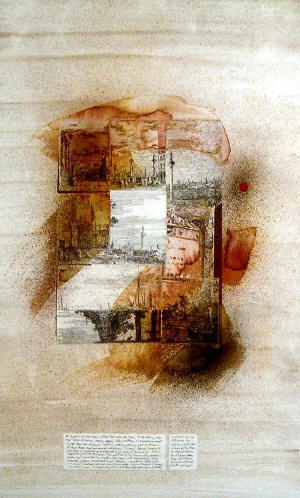
We lived in an old house
January 18, 1986
|
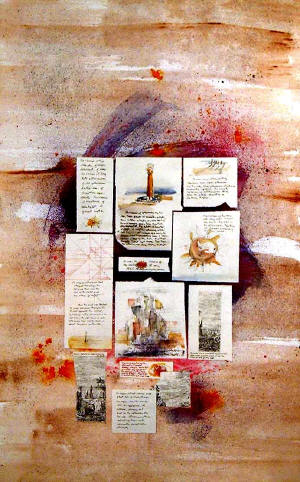
The Venice of the islands
January 20, 1986 |
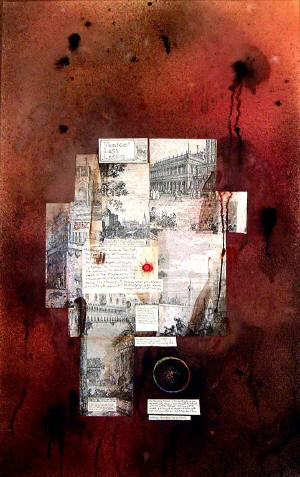
Venice' last lesson
January 21, 1986Looking
now through my 1986 notes for this painting, I found:
Venice’ Last Lesson:
The Rainbow Flower is the Blossoming
Of all the senses in Unity,
In the Blossoming of the Rainbow flower
We leave time for Eternity.
The
“Rainbow Flower” is the rainbow ring lower right. There is a red spot
at its center; and I wrote what
the red is:
Oh, the red of a deep passion.
|
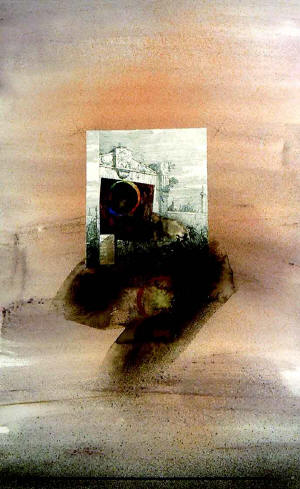
Rainbow sunset--a Venetian Farewell
February 21. 1986 |
Click here for
1986, The Romans and Others...
Click here for 1987-89
Click
here for 1990
Click here for
1991
|
|